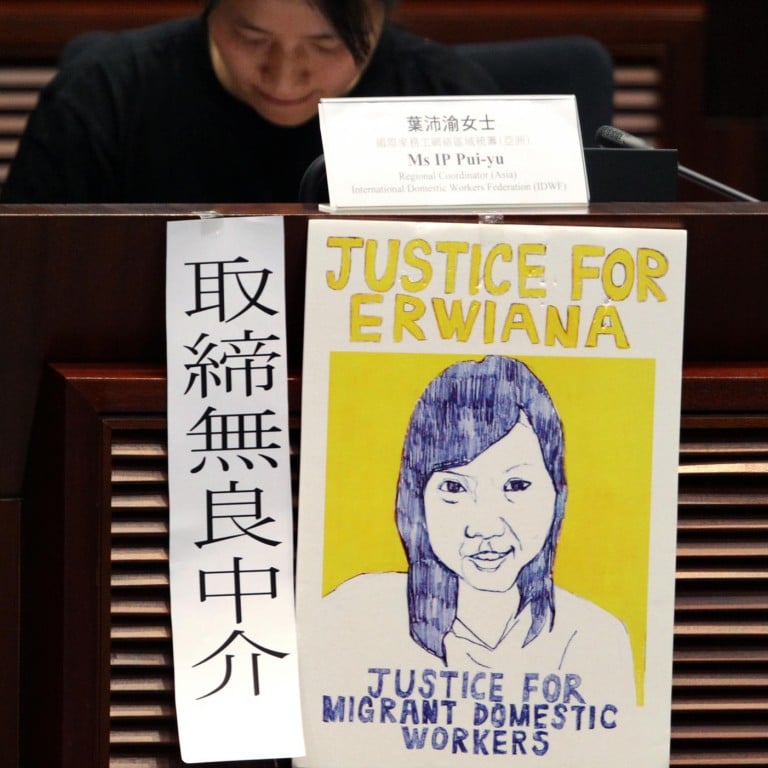
Hong Kong’s maid agencies face tough new rules after Erwiana case
Labour chief promises action to show 'bad apples we mean business' following allegations of abuse that made headlines around the world
Hong Kong will overhaul its regulatory system for foreign domestic helpers and revise punishments for unscrupulous employment agencies that are currently set "too low", the labour and welfare secretary told the on Thursday.
The Labour Department would step up surveillance of agencies and hire "retired police officers to join the ranks of inspectors to show the bad apples we mean business", added Matthew Cheung Kin-chung.
Before helpers come, they are often already indebted because of the hefty fees. We have been expressing our concern to the [Indonesian] government
His remarks came after an announcement stating the bureau would work with the Department of Justice on a comprehensive reform of the rules governing foreign domestic helpers and the employment agencies that recruit and supervise them.
But the government also made clear it would not budge on its rule insisting domestic helpers live with employers - a rule that has been at the centre of recent protests by helpers.
Cheung told a meeting of the Legislative Council's manpower panel yesterday: "We need to strike a balance between the [current] situation ... and having too many regulations."
Community groups had been invited to share their views at the meeting following the alleged abuse of Indonesian helper Erwiana Sulistyaningsih - allegations which made headlines around the world and, as several politicians remarked at the meeting, "put Hong Kong to shame".
Cheung got an angry response from migrant advocates at the meeting when he emphasised the role the Indonesian government played in allowing the country's employment agencies to charge high training fees.
"Before helpers come, they are often already indebted because of the hefty fees," he said. "We have been expressing our concern to the [Indonesian] government, and I even suggested to a high-ranking official that [it] should provide helpers with low-interest loans [instead] of having the profit go to agencies," Cheung added.
Holly Allan, manager of Helpers for Domestic Helpers, said Cheung had downplayed the responsibility of the Hong Kong government to monitor the city's own agencies, which she said frequently colluded with moneylenders to overcharge helpers on fees payable to them.
Robert Godden, Asia-Pacific campaign co-ordinator for Amnesty International, said that Hong Kong had been "strangely hesitant" to apply more effective methods to protect domestic helpers. "The government must urgently establish a robust monitoring system that allows for proactive investigation of placement agencies suspected of abuses.
"Those found to be involved in labour exploitation must face adequate punishment that reflects the serious nature of the crime," he told the meeting.
Several employers' associations, including the Hong Kong Employers of Domestic Helpers Association, also supported stronger penalties for abusive agencies, but community groups clashed in opinions over whether the "live-in rule" should be abolished. "Accidental pregnancies are already a problem. If helpers are allowed to live away from employers, there will be more pregnancies ... and others will take illegal part-time jobs," said Liberal Party youth committee member Harris Yeung.
In response to fears that abolishing the two-week rule, whereby helpers must leave Hong Kong within two weeks of termination of their contracts, would encourage "job-hopping", Parichat Jaroennon, of the Thai Migrant Workers Union, said: "We are here in Hong Kong to make money for our families, not to play [the system]. If we change jobs, there are no advantages for us because we have to pay the agencies more fees."
In a paper submitted to the panel yesterday, the government said it would keep both the two-week and live-in rules.
"The main purpose of the two-week rule is to allow foreign domestic workers sufficient time to prepare for their departure and not to facilitate them to find new employers," the paper stated.
As for the live-in rule, the government said the import of foreign labour was to "meet the acute shortfall of local live-in domestic workers", and that foreign domestic helpers were informed of this beforehand.
Law Wan-tung, 44, the woman who employed Erwiana, has been charged with causing grievous bodily harm with intent, assault occasioning actual bodily harm, common assault, and four counts of criminal intimidation.

